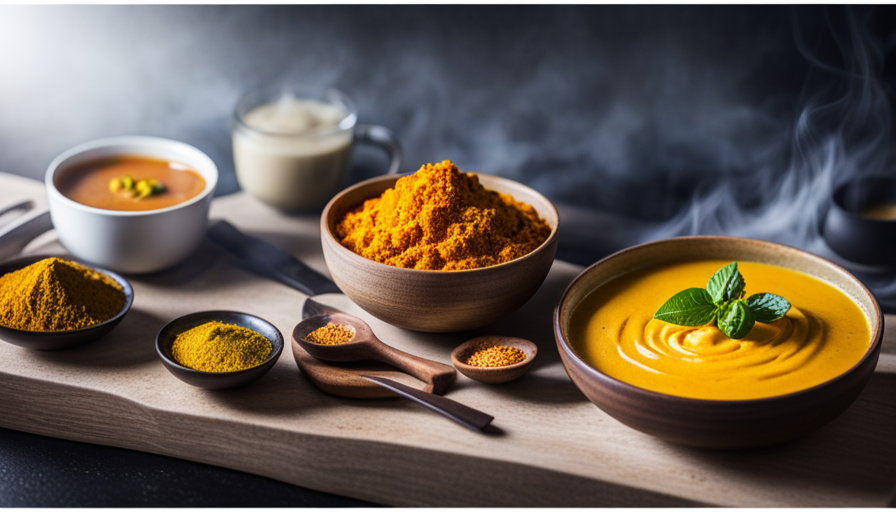I’ve consistently had a fascination with natural solutions to enhance my well-being. Recently, turmeric tea has emerged as a highly discussed herbal remedy. Employed for generations within Ayurvedic healing traditions, turmeric’s appeal has grown alongside contemporary scientific investigations. It is celebrated for its capacity to reduce inflammation, offering relief from joint discomfort and shielding against chronic illnesses like cancer and Alzheimer’s.
However, not all turmeric teas are created equal. To get the maximum benefits from turmeric, it’s important to add pepper and fat to your tea. This may sound odd at first, but there is a scientific reason behind this combination.
In this article, I’ll dive into the science behind why you should add pepper and fat to your turmeric tea, how much pepper and fat you should use, and other ways to enhance absorption. Whether you’re new to turmeric or a seasoned enthusiast, this information can help you make the most of your daily cup of tea!
Key Takeaways
- Fresh turmeric root is recommended over powdered turmeric for making turmeric tea.
- Black pepper and fat can enhance the absorption of curcumin in turmeric tea, but it’s important to follow expert recommendations on the optimal amount to add.
- Consuming up to 1-2 teaspoons of turmeric per day is generally safe, but caution must be taken when consuming large amounts or taking supplements.
- Turmeric tea can be customized to suit taste preferences and can be paired with other ingredients such as ginger or cinnamon for added flavor and anti-inflammatory benefits.
The Health Benefits of Turmeric Tea
You’ll be amazed at how much healthier you’ll feel after just one cup of turmeric tea! Not only is it a delicious and comforting drink, but it also comes with a host of health benefits.
Turmeric contains curcumin, which is known for its anti-inflammatory properties. This compound can help reduce inflammation in the body, which has been linked to various chronic diseases.
To make your own turmeric tea, there are several recipes and brewing tips available online. Many people like to mix turmeric with other ingredients such as ginger or cinnamon for added flavor. It’s important to note that when making turmeric tea, it’s best to use fresh turmeric root rather than powdered turmeric. This will ensure that you’re getting all of the necessary nutrients and antioxidants.
While adding pepper and fat may seem like an odd combination for a tea recipe, it’s actually essential if you want to reap the full benefits of curcumin. Pepper contains piperine, which has been shown to increase the absorption of curcumin by up to 2000%. Meanwhile, adding fat (such as coconut oil or ghee) can further enhance absorption as curcumin is fat-soluble.
So next time you brew yourself a cup of turmeric tea, don’t forget to add a pinch of pepper and some healthy fats!
The Importance of Adding Pepper and Fat
When it comes to a delicious dish, adding a pinch of salt can enhance the flavor, but sprinkling in some spices and fats is like adding the cherry on top.
In terms of turmeric tea, it’s important to add pepper and fat for optimal benefits. The compound in turmeric responsible for its health benefits is called curcumin, but unfortunately, our bodies can’t absorb it very well on its own.
To help increase absorption, we need to add black pepper. Black pepper contains piperine, which has been shown to enhance curcumin absorption by up to 2000%. If you’re not a fan of black pepper or simply want an alternative, you could try long pepper or ginger instead.
Long pepper is similar to black pepper but has a milder taste while ginger adds a spicy kick and also has anti-inflammatory properties.
As for fat substitutes, coconut milk is a popular choice as it adds creaminess and healthy fat without overpowering the tea’s flavor. Other options include ghee (clarified butter) or almond milk. Adding fat helps with curcumin absorption because curcumin is fat-soluble, meaning it needs dietary fats present for our bodies to process it efficiently.
Incorporating both black pepper (or alternatives) and healthy fats into your turmeric tea can help ensure that you’re reaping all of its potential health benefits. And speaking of those benefits – let’s dive deeper into the science behind them in the next section.
The Science Behind the Benefits
Understanding the scientific reasoning behind the potential health benefits of adding certain ingredients to your turmeric drink can help you make informed decisions about your diet. Turmeric contains a powerful compound called curcumin, which has been shown to have anti-inflammatory and antioxidant properties. However, curcumin is not easily absorbed by the body on its own. This is where pepper and fat come in.
Pepper contains a compound called piperine, which has been shown to increase curcumin absorption by up to 2000%. Meanwhile, fat helps with turmeric bioavailability. This means that incorporating both pepper and fat into your turmeric tea can greatly enhance its potential benefits.
To better understand the science behind these ingredients, take a look at this table:
| Ingredient | Role | Example |
|---|---|---|
| Turmeric | Contains curcumin with anti-inflammatory and antioxidant properties | Powder or fresh root |
| Pepper | Contains piperine, increases curcumin absorption by up to 2000% | Black pepper |
| Fat | Helps with turmeric bioavailability | Coconut oil or ghee |
By adding pepper and fat to your turmeric tea, you can optimize the absorption of its beneficial compounds. In the next section, we will discuss how much pepper you should add for maximum effect without compromising taste.
How Much Pepper to Add
To really enhance the benefits of your golden drink, it’s important to know just the right amount of spice to add. Turmeric tea is typically made with black pepper because piperine, a compound in black pepper, increases the bioavailability of curcumin in turmeric.
The optimal pepper ratio for turmeric tea is 1/8 teaspoon per cup of water. However, some people may prefer a stronger or milder taste depending on their personal preference. In this case, adjusting the amount of pepper can be done by trial and error until you find your perfect balance.
It’s worth noting that adding too much pepper can make your tea too spicy and overpower the flavor of turmeric. Now that we’ve covered how much pepper to add to your turmeric tea, let’s move onto the next crucial ingredient- fat.
Adding fat such as coconut oil or ghee helps increase the absorption of curcumin in turmeric even further.
How Much Fat to Add
When it comes to adding fat to turmeric tea, there isn’t a one-size-fits-all answer. As I researched the topic, I found that experts have varying recommendations on the optimal amount of fat to add for maximum absorption of curcumin, the active ingredient in turmeric.
Some suggest adding as little as half a teaspoon of coconut oil or ghee, while others recommend up to two tablespoons of full-fat milk or cream.
Research on Optimal Amounts
You should aim to incorporate a sufficient amount of black pepper and healthy fat into your turmeric tea recipe in order to fully reap the potential anti-inflammatory benefits. According to research, optimal dosages of both black pepper and fat can enhance the absorption of curcumin, the active ingredient in turmeric, by up to 2,000%.
Black pepper contains piperine, which has been shown to increase curcumin absorption by inhibiting enzymes that break down the compound before it can be absorbed. On the other hand, incorporating healthy fats such as coconut oil or ghee into your tea can also improve curcumin’s bioavailability.
However, it is important to note that while adding black pepper and fat can increase turmeric’s health benefits, excessive consumption may come with potential risks. High doses of black pepper extract have been linked with gastrointestinal distress and liver toxicity in some cases. Additionally, consuming too much fat can lead to weight gain and other health complications if not balanced with a healthy diet and lifestyle.
Thus, it’s recommended to follow expert recommendations on how much black pepper and fat you should add to your turmeric tea for optimal results without putting your health at risk.
Recommendations from Experts
Experts recommend following their advice on the appropriate amounts of black pepper and healthy fat to add to your recipe for optimal absorption and potential health benefits. Adding a pinch of black pepper to your recipe can significantly improve your body’s ability to absorb curcumin as black pepper contains piperine, a compound that enhances curcumin’s bioavailability in turmeric tea.
However, consuming too much turmeric or taking high doses of supplements may lead to side effects such as upset stomach, diarrhea, headaches, and dizziness. Hence, it’s crucial to stick to the recommended dosage and timing when consuming turmeric tea. Generally, you can consume up to 1-2 teaspoons (around 5-10 grams) of turmeric per day without experiencing any adverse effects.
For better digestion and absorption, it’s best to consume turmeric tea after meals. Other ways to enhance absorption include pairing turmeric with ginger or cinnamon or adding coconut oil or ghee instead of regular milk for added healthy fats.
Other Ways to Enhance Absorption
Adding a pinch of black pepper and a source of healthy fat, such as coconut oil or almond milk, can boost the absorption of curcumin in your turmeric tea. However, there are alternative methods available to enhance the absorption even further.
One common mistake is boiling turmeric powder directly in water, which can decrease its bioavailability. One way to avoid this mistake is by making a turmeric paste beforehand. Simply mix turmeric powder with water and heat it up until it turns into a paste. This will increase its solubility and make it easier for your body to absorb curcumin.
Another method is to add ginger into your tea. Ginger has been shown to enhance the anti-inflammatory effects of curcumin. In addition, you can also consume turmeric with meals high in protein or fiber since they both slow down digestion and increase the time that curcumin stays in your system.
With these alternative methods, you’ll be able to reap more benefits from your daily cup of turmeric tea! When preparing turmeric tea, keep in mind that incorporating these tips will help improve its absorption rate and give you better results overall.
Preparing Turmeric Tea
When it comes to preparing turmeric tea, there are a few key points that can make a big difference in the flavor and health benefits of the final product.
First and foremost, it’s important to choose high-quality ingredients including fresh turmeric root, black pepper (which enhances the absorption of curcumin, the active compound in turmeric), and healthy fats like coconut oil or ghee.
Additionally, brewing methods can vary depending on personal preference but generally involve simmering the ingredients together for several minutes before straining and enjoying.
Choosing the Right Ingredients
To ensure a delicious and healthy cup of turmeric tea, it’s important to select the right ingredients. When choosing ingredients for your turmeric tea, there are several options to consider:
- Turmeric is the main ingredient in turmeric tea and provides numerous health benefits.
- Adding black pepper to your turmeric tea increases the bioavailability of curcumin, which is the active compound in turmeric that provides many of its health benefits.
- Incorporating a fat source such as coconut milk or ghee helps with absorption of curcumin.
- You can add other spices like ginger or cinnamon for added flavor and health benefits.
By selecting these key ingredients, you can enhance the taste and nutritional value of your turmeric tea. Now let’s move on to exploring different brewing methods.
Brewing Methods
Now that we know how to choose the right ingredients, it’s time to learn about brewing methods for turmeric tea. There are many variations of turmeric tea, and each requires different techniques to brew properly. Some popular variations include golden milk tea, ginger turmeric tea, and honey turmeric tea.
To help you visualize these different brewing techniques, I’ve created a table below outlining the steps for each variation:
| Tea Variation | Brewing Technique |
|---|---|
| Golden Milk Tea | Simmer coconut milk with grated ginger, cinnamon stick, black pepper, and ground turmeric for 10 minutes. Strain and sweeten with honey. |
| Ginger Turmeric Tea | Boil water with sliced ginger root and turmeric powder for 5-10 minutes. Remove from heat and let steep for an additional 5 minutes. Strain and add lemon juice or honey if desired. |
| Honey Turmeric Tea | Boil water with grated fresh or ground turmeric for 3-5 minutes. Remove from heat and let steep for an additional 3-5 minutes. Stir in raw honey until dissolved before serving. |
Using the appropriate brewing technique is essential to maximize the benefits of your turmeric tea. Experiment with different variations to find which one works best for you.
When it comes to consuming any herbal beverage or supplement, it’s important to consider safety precautions as well. Let’s explore some important tips in the next section on how to safely enjoy your delicious cup of turmeric tea!
Safety and Precautions
Caution must be taken when consuming turmeric tea, as excessive consumption may lead to gastrointestinal issues and interactions with certain medications. Although turmeric is generally considered safe when consumed in small amounts as a spice or flavoring agent, it’s important to follow dosage recommendations when making turmeric tea.
The recommended daily intake of curcumin, the active ingredient in turmeric, is 500-2000mg. It’s also important to note that adding black pepper and fat to your turmeric tea can enhance the absorption of curcumin into the body. Black pepper contains piperine, which has been shown to increase the bioavailability of curcumin by up to 2000%. Adding a source of fat such as coconut milk or almond butter can also improve absorption, as curcumin is fat-soluble.
In addition to following dosage recommendations and incorporating black pepper and fat into your turmeric tea recipe, it’s important to consult with a healthcare provider before regularly consuming large amounts of turmeric or taking supplements. Turmeric may interact with certain medications such as blood thinners and diabetes medications. It’s always best to err on the side of caution and seek medical advice before making significant changes to your diet or supplement regimen.
With these precautions in mind, let’s explore how you can easily incorporate turmeric tea into your daily routine for optimal health benefits.
How to Incorporate Turmeric Tea into Your Diet
One great way to add more of this healthy spice to your diet is by sipping on a warm and comforting cup of turmeric-infused brew. Turmeric tea is easy to make and can be customized to suit your taste preferences. To make the perfect cup of turmeric tea, all you need is boiling water, turmeric powder, black pepper, and a source of fat.
To incorporate turmeric tea into your diet, you can start by making it a regular part of your morning routine. You can also enjoy a cup in the afternoon as an alternative to coffee or other caffeinated beverages. It’s important to note that adding black pepper and a source of fat like coconut oil or ghee can help improve the bioavailability of curcumin, which is the main active ingredient in turmeric.
Here’s a simple recipe for making turmeric tea:
| Ingredients | Measurements |
|---|---|
| Boiling water | 1 cup |
| Turmeric powder | 1/2 teaspoon |
| Black pepper | A pinch |
| Coconut oil or ghee (optional) | 1/2 teaspoon |
Simply mix all ingredients together in a mug and let steep for about ten minutes before enjoying. By incorporating this delicious and healthy drink into your daily routine, you’ll be reaping the many benefits that come with consuming turmeric regularly.
Frequently Asked Questions
Can turmeric tea be used as a substitute for medication?
Turmeric tea is a popular drink with many supposed health benefits. However, it shouldn’t be used as a substitute for medication without consulting a healthcare professional.
While there are potential benefits to consuming turmeric, such as its anti-inflammatory properties and potential to improve brain function, there are also risks associated with excessive intake or interactions with certain medications.
The effectiveness of turmeric tea in treating specific medical conditions hasn’t been thoroughly researched, so it shouldn’t be relied upon solely for treatment.
It’s important to understand the proper dosage and any potential risks before incorporating turmeric into your diet or using it as a supplement.
Is turmeric tea safe for pregnant women?
Pregnancy safety is a crucial concern when it comes to consuming any kind of food or drink. Turmeric tea, in general, is considered safe for pregnant women when consumed in moderation. However, it’s important to consult with your healthcare provider before incorporating turmeric tea into your diet during pregnancy.
The dosage recommendations for turmeric tea vary depending on the individual’s health condition and medical history. It’s generally recommended to limit the consumption of turmeric tea during pregnancy to one cup per day and avoid taking high doses of curcumin supplements without consulting with a healthcare professional first.
Overall, while turmeric tea can be a healthy addition to one’s diet during pregnancy, it’s important to practice caution and follow appropriate dosage recommendations.
Can turmeric tea help with anxiety and depression?
Anxiety and depression can be debilitating mental health conditions, affecting individuals in various ways. As someone who’s experienced the challenges of managing these conditions, I’ve researched different remedies that could potentially alleviate some of my symptoms.
One natural option that caught my attention is turmeric tea, which is believed to offer a range of benefits for overall well-being. Turmeric contains curcumin, a compound with potent anti-inflammatory properties that may help reduce anxiety and depression symptoms. While more research is needed to confirm the effectiveness of turmeric for these purposes, some studies suggest it could be an effective complementary treatment option.
When preparing turmeric tea, adding black pepper and fat (such as coconut oil) may enhance its absorption and bioavailability, allowing you to reap more of its potential benefits. Overall, while turmeric tea should not replace professional treatment options for anxiety or depression, incorporating it into your routine may provide some added relief to support your mental health journey.
Can turmeric tea be consumed before bed?
I’ve found that drinking turmeric tea before bed can provide several nighttime benefits.
Turmeric contains compounds that have been shown to reduce inflammation and promote relaxation, which may help improve sleep quality.
However, it’s important to note that the recommended dosage of turmeric varies depending on the individual and their health needs.
It’s always best to consult with a healthcare professional before incorporating any new supplements or remedies into your routine, especially if you’re taking medication or have a pre-existing condition.
Overall, while there may be potential benefits to consuming turmeric tea before bed, it’s important to approach its use with caution and proper guidance.
Can turmeric tea help with weight loss?
Did you know that more than two-thirds of adults in the United States are considered overweight or obese? It’s a startling statistic, and one that highlights the importance of maintaining a healthy weight.
One way to potentially achieve this is by incorporating turmeric tea into your daily routine. Studies suggest that turmeric tea may aid in weight loss by boosting metabolism and reducing inflammation. Additionally, turmeric has been shown to have benefits for skin health, making it a great all-around addition to your wellness regimen.
So why not give it a try? Just remember to use high-quality ingredients and consult with your healthcare provider before making any significant changes to your diet.
Conclusion
Well, there you have it, folks – the science-backed benefits of turmeric tea and how to enhance its absorption. But before we go our separate ways, I want to leave you with a little suspense.
What if I told you there’s one more thing you can do to make your turmeric tea even more potent? Something that involves no additional ingredients or preparation steps. It’s something that we all do every day but probably not often enough. Are you curious yet? Keep reading!
The secret is simply drinking enough water throughout the day. That’s right – staying hydrated can improve the absorption of curcumin in turmeric tea by promoting blood flow and reducing inflammation in the gut.
So, as always, don’t forget to drink your water! And don’t forget to enjoy a warm cup of turmeric tea for its many health benefits too.










